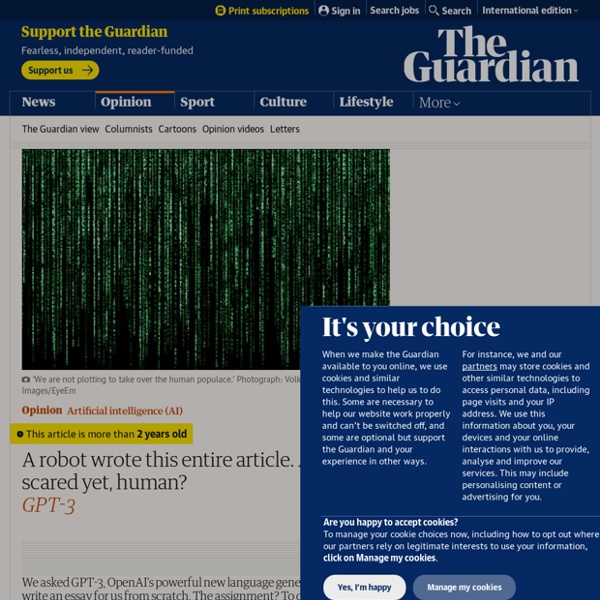A robot wrote this entire article. Are you scared yet, human?

https://www.theguardian.com/commentisfree/2020/sep/08/robot-wrote-this-article-gpt-3
Related: 2020 國際財經新聞
• Human Ingenuity
Principled Artificial Intelligence
The rapid spread of artificial intelligence (AI) systems has precipitated a rise in ethical and human rights-based frameworks intended to guide the development and use of these technologies. Despite the proliferation of these "AI principles," there has been little scholarly focus on understanding these efforts either individually or as contextualized within an expanding universe of principles with discernible trends. To that end, this white paper and its associated data visualization compare the contents of thirty-six prominent AI principles documents side-by-side. This effort uncovered a growing consensus around eight key thematic trends: privacy, accountability, safety and security, transparency and explainability, fairness and non-discrimination, human control of technology, professional responsibility, and promotion of human values.
Study shows AI-generated fake reports fool experts
Takeaways · AIs can generate fake reports that are convincing enough to trick cybersecurity experts. · If widely used, these AIs could hinder efforts to defend against cyberattacks. · These systems could set off an AI arms race between misinformation generators and detectors. If you use such social media websites as Facebook and Twitter, you may have come across posts flagged with warnings about misinformation.
Trump Signs Executive Order Promoting Artificial Intelligence
President Trump signed an executive order Monday meant to spur the development and regulation of artificial intelligence, technology that many experts believe will define the future of everything from consumer products to health care to warfare. A.I. experts across industry, academia and government have long called on the Trump administration to make the development of artificial intelligence a major priority. Last spring, worried that the United States was not keeping pace with China and other countries, Jim Mattis, then the defense secretary, sent a memo to the White House imploring the president to create a national strategy on A.I. Now, Mr. Trump has taken that step, though this “American A.I.
Big Data is the new Artificial Intelligence
This is the first of a couple columns about a growing trend in Artificial Intelligence (AI) and how it is likely to be integrated in our culture. Computerworld ran an interesting overview article on the subject yesterday that got me thinking not only about where this technology is going but how it is likely to affect us not just as a people. but as individuals. How is AI likely to affect me? The answer is scary. Today we consider the general case and tomorrow the very specific.
The Turing Podcast
The Turing Podcast is an exciting new podcast where we discuss all things data science, AI and machine learning with a focus on real-time research taking place at the Turing. Hear directly from researchers who use data science, AI and machine learning to advance projects that cover areas that span from air traffic control to the discovery of exoplanets and even facilitating citizen democracy across the world. The podcast is currently hosted by Ed Chalstrey, Jo Dungate, Bea Costa Gomes and Rachel Winstanley, and is produced by Dan Whitfield.
The Alan Turing Institute
About The Turing Lectures The Turing Lectures series features influential figures from the dynamic world of data science and artificial intelligence. These prestigious, landmark lectures lead and shape the national conversation, sparking debate, informing and, of course, entertaining audiences.
The Alan Turing Institute
Related:




Bot's Editors: GPT-3 produced eight different outputs as essays. Each was unique, interesting, and advanced a different argument. The Guardian could have just run one of the essays in its entirety. We chose instead to pick the best parts of each: in order to capture the different styles and registers of the AI. Editing GPT-3’s op-ed was no different than editing a human op-ed. We cut lines and paragraphs and rearranged the order of them in some places. Overall, it took less time to edit than many human op-eds. by cazimi Jun 6